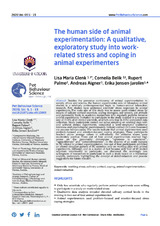Mostrar el registro sencillo del ítem
The human side of animal experimentation: A qualitative, exploratory study into workrelated stress and coping in animal experimenters
| dc.contributor.author | Glenk, Lisa Maria | |
| dc.contributor.author | Belik, Cornelia | |
| dc.contributor.author | Palme, Rupert | |
| dc.contributor.author | Aigner, Andreas | |
| dc.contributor.author | Jensen-Jarolim, Erika | |
| dc.date.accessioned | 2020-05-24T18:51:22Z | |
| dc.date.available | 2020-05-24T18:51:22Z | |
| dc.date.issued | 2020 | |
| dc.identifier.issn | 2445-2874 | |
| dc.identifier.uri | http://hdl.handle.net/10396/19974 | |
| dc.description.abstract | Besides the pervasive controversy of animal experimentation in society, ethics and science, the human experimenter side of laboratory animal studies is a relatively underrepresented topic in human-animal interaction research. Few studies have addressed scientists’ stress responses to animal experiments. The main aim of this study was to assess work-related stress by means of salivary cortisol secretion, coping strategies, self-esteem, pet attitude and personality traits in academic researchers who regularly perform invasive animal experiments. Invitation to participate in the study resulted in a response rate of 15.4% of 65 invited scientists, of which only four (6.15%) completed data collection. Study participants carried out saliva sampling on working days with and without animal experiments, completed a semi-structured qualitative interview and psychological questionnaires. Salivary cortisol (SC) was measured via enzyme immunoassay. The results indicate that animal experimenters used problem-focused and emotion-focused coping strategies. Three participants reached above average values in self-esteem. Pet attitudes scores were moderately positive. Three out of four animal experimenters reached high scores on the personality dimensions "openness to experience", "agreeableness" and "conscientiousness". In the absence of an acute increase in SC related to animal experimentation, two out of four participants exhibited an altered circadian pattern of SC secretion only on working days with animal experiments. Although and as a matter of fact because only four of 65 invited scientists volunteered to participate, we discussed the seemingly low willingness of researchers to participate in such a study based on a theoretical analysis, particularly highlighting the concept of deindividuation and provide suggestions for future research. | es_ES |
| dc.format.mimetype | application/pdf | es_ES |
| dc.language.iso | eng | es_ES |
| dc.publisher | Universidad de Córdoba, Departamento de Medicina y Cirugía Animal | es_ES |
| dc.rights | https://creativecommons.org/licenses/by-nc-sa/4.0/ | es_ES |
| dc.source | Pet Behaviour Science 9, 1-15 (2020) | es_ES |
| dc.subject | Working stress | es_ES |
| dc.subject | Salivary cortisol | es_ES |
| dc.subject | Coping | es_ES |
| dc.subject | Animal experimentation | es_ES |
| dc.subject | Deindividuation | es_ES |
| dc.title | The human side of animal experimentation: A qualitative, exploratory study into workrelated stress and coping in animal experimenters | es_ES |
| dc.type | info:eu-repo/semantics/article | es_ES |
| dc.relation.publisherversion | http://www.uco.es/ucopress/ojs/index.php/pet/index | es_ES |
| dc.rights.accessRights | info:eu-repo/semantics/openAccess | es_ES |

